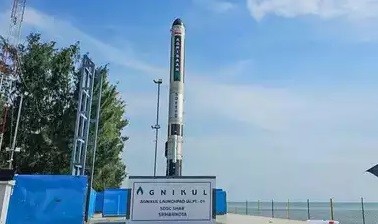04/06/2024
04/06/2024

INDIA, June 4: Indian space startup Agnikul Cosmos marked a significant achievement on Thursday (May 30) with the successful launch of the nation's first-ever 3D-printed rocket engine. The milestone not only promises to streamline rocket-building processes but also aims to bolster India's capabilities in space exploration.
"This signals the ability to rapidly assemble rockets that is unparalleled," remarked Satyanarayanan Chakravarthy, a professor of aerospace engineering at the Indian Institute of Technology in Madras and part of Agnikul Cosmos.
The launch, which also marked India's second private rocket launch, showcased the utilization of a semi-cryogenic engine—a notable advancement in propulsion technology. Unlike traditional cryogenic engines, semi-cryogenic engines use refined kerosene instead of liquid hydrogen, resulting in reduced storage requirements and lower operational complexities while maintaining high thrust capabilities.
Named Agnibaan Sorted (Suborbital Technology Demonstrator), the rocket is designed to carry payloads of up to 660 pounds (300 kilograms) into a 435-mile (700-kilometer) orbit. Thursday's launch from the Satish Dhawan Space Center in Sriharikota was Agnikul Cosmos's fifth attempt at the mission, finally achieving success after previous technical setbacks.
The two-minute flight reached an altitude of five miles (eight kilometers) before landing in the Bay of Bengal, meeting all mission objectives. "This is the culmination of 1000s of hours of reviews and hard work by the team," noted Srinath Ravichandran, co-founder and CEO of Agnikul Cosmos.
Data collected from the test flight will inform the development of Agnikul Cosmos's orbital launch vehicle, Agnibaan, slated for potential launch by early next year.
Pawan Goenka, chairman of the Indian National Space Promotion and Authorization Center (IN-SPACe), hailed the successful mission as "a historic moment for India's space sector" and emphasized its significance for private players contributing to the nation's space endeavors.
The launch also garnered attention from the Indian Space Association (ISpA), which believes it will enhance global confidence in India's private space industry.
Agnikul Cosmos's automated 3D printing technology enables the production of one rocket engine in approximately 75 hours—a stark contrast to the conventional 10 to 12 weeks required. This efficiency holds promise for accelerating India's space ambitions and underscores the transformative potential of innovative technologies in the sector.
Additionally, India's national space agency, the Indian Space Research Organization (ISRO), recently tested a 3D-printed rocket engine, further demonstrating the country's commitment to leveraging advanced manufacturing techniques to enhance space exploration capabilities.


